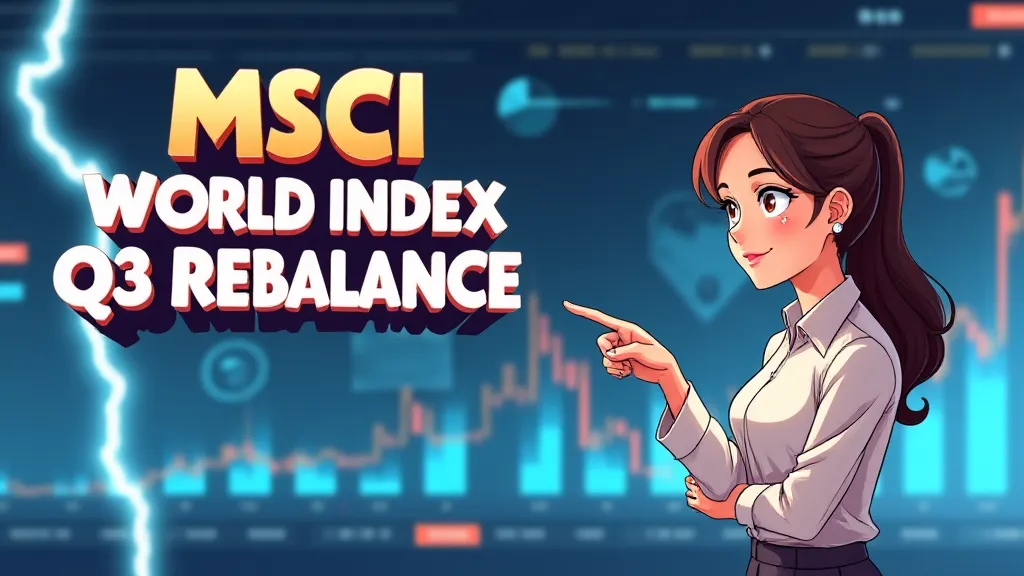
Hi friends! Today we’re diving into the fascinating world of global stock markets as we approach a major calendar event: the MSCI World Index February 2026 Quarterly Index Review. With the announcement just around the corner, analysts from major investment banks are buzzing about why Energy and Pharmaceutical companies are poised to gain significant attention. Whether you’re a seasoned investor or just starting your financial journey, understanding these potential shifts is crucial. We’ll explore how this quarterly reshuffling works, why experts predict certain sectors could outperform, and what it means for your portfolio. Grab your favorite drink and let’s decode these market movements together!
Understanding MSCI World Index stocks Fundamentals
The MSCI World Index represents a crucial barometer for global equity markets, tracking over 1,500 large and mid-cap stocks across 23 developed countries. Covering approximately 85% of the free float-adjusted market capitalization in each country, this index serves as the foundation for trillions in investment products worldwide. When we talk about the upcoming February 2026 Rebalance, we’re referring to the quarterly process where the index composition gets reviewed and adjusted. This ensures the index accurately reflects the evolving global market landscape, maintaining its relevance for investors tracking global equity markets.
What makes the MSCI World Index particularly influential is how extensively it’s used as a benchmark by institutional investors and fund managers. The selection criteria focus on market size, liquidity, and free float availability—meaning only shares readily available for public trading are considered. Companies must meet stringent requirements including minimum market cap thresholds, trading volume consistency, and foreign inclusion limits. This rigorous screening creates an index that truly represents investable opportunities.
The weighting mechanism deserves special attention because it directly impacts how the February 2026 review influences capital flows. Stocks aren’t equally weighted but rather weighted by their market capitalization. During rebalancing, if a company’s market cap has grown significantly relative to others since the last review (November 2025), its weight is likely to increase. This quarter, market watchers are anticipating notable shifts as recent energy sector performance and pharmaceutical stocks growth have created disproportionate market cap expansions. MSCI index changes thus become critical events that can trigger billions in institutional portfolio adjustments.
Breaking Down the February 2026 Rebalance Mechanics
The February 2026 Quarterly Index Review follows MSCI’s standard schedule. This particular review is proving significant due to the sector divergences observed over the last quarter. The mechanics begin with MSCI’s quantitative screening of all eligible stocks across developed markets.
Pro Insight: It’s important to note that MSCI typically uses data from any of the last 10 business days of January as the cutoff date for these calculations. This specific “Cutoff Date” determines the market cap snapshots used to decide additions and deletions.
| Event | Expected Date |
|---|---|
| Cutoff Date (Data Snapshot) | Any trading day: Jan 20 – Jan 31, 2026 |
| Announcement Date | February 12, 2026 (approx.) |
| Effective Date (Implementation) | Close of trading: February 27, 2026 |
The rebalancing process creates tangible market movements because trillions in passive funds automatically mirror these adjustments. When a stock is added to the index, index fund updates require massive institutional buying, while deletions trigger equivalent selling pressure. Analysts predict that energy companies are strong candidates for weight increases due to energy sector performance driving market cap growth in Q4 2025. Pharmaceutical giants are also expected to gain representation following recent rallies. MSCI World Index adjustments thus create self-reinforcing cycles where inclusion begets more buying.

Geographical reshuffling is also on the cards. Japan’s weight might see downward adjustments due to the weaker Yen impacting dollar-denominated market caps, while the US could gain due to tech and pharma strength. These regional shifts reflect how currency fluctuations and top performing sectors influence country allocations. The MSCI index changes will also adjust for free float fluctuations, where companies with significant insider or government ownership see their investable shares recalculated—an often overlooked but impactful technical factor.
Energy Sector Performance: Fueling Market Expectations
The remarkable energy sector performance driving expectations for this rebalance stems from a perfect storm of geopolitical and macroeconomic factors observed in recent months. Crude oil prices have shown resilience due to production management strategies and sustained global demand. This price momentum has directly boosted revenues for exploration and production companies, making them strong candidates for weight increases within the MSCI World Index.

Beyond traditional oil and gas, renewable energy companies are contributing to the sector’s momentum. Solar and wind equipment manufacturers have seen sustained demand as global energy transition efforts accelerate. Companies in the green energy space are likely to gain index weight during the stock market rebalancing due to expanding market capitalizations. This potential green energy surge demonstrates how the energy sector performance story extends beyond fossil fuels, creating a diversified growth narrative within the index.
🔎 Stocks & Sectors to Watch
Based on recent market cap growth, analysts are closely monitoring these areas for potential weight increases:
- Energy Giants: Companies like ExxonMobil, Shell, or Chevron may see weight adjustments if their recent earnings beat expectations relative to other sectors.
- Renewables: Leaders in solar and wind technology could be candidates for inclusion or weight bumps as the green transition accelerates.
Note: Mentioned companies are illustrative examples of sector leaders.
Financial metrics reveal why energy is expected to dominate the February Rebalance conversation. The sector’s free cash flow yield has remained attractive compared to the index average, making it exceptionally appealing to income-focused investors. Energy companies have also demonstrated capital discipline, enhancing investor confidence. These shareholder-friendly policies support the case for continued energy sector performance despite broader economic headwinds.
Pharmaceutical Stocks Growth: The Healthcare Surge
The pharmaceutical stocks growth phenomenon potentially reshaping the MSCI World Index stems from powerful demographic and innovation tailwinds. Global pharmaceutical revenues have shown significant year-over-year resilience. This sector strength is expected to translate directly into the February 2026 rebalance through increased weightings for companies leading in obesity drugs (GLP-1 agonists) and other blockbuster therapies.
Beyond specific drug successes, structural healthcare demands underpin pharmaceutical stocks growth. Aging populations in developed markets drive consistent medication usage increases. Chronic disease prevalence continues rising globally, creating predictable revenue streams for pharmaceutical companies. This makes healthcare among the most defensive sectors during economic uncertainty, a quality highly valued in current equity markets.
💉 The “Obesity Drug” Factor
The explosive growth of weight-loss drugs has been a primary driver for the pharma sector in 2025-26. Market leaders like Novo Nordisk and Eli Lilly have seen massive market cap expansion. If this trend held through January, their weightage in global indices like MSCI World is almost certain to rise, pulling capital into the sector.
Regulatory developments have further accelerated pharmaceutical stocks growth leading up to this rebalancing period. Drug approvals have maintained a steady pace, enhancing investor confidence. These regulatory tailwinds are likely to be reflected in the MSCI index changes, potentially increasing healthcare allocations across global portfolios.
Decoding Potential MSCI index changes and Impacts
The specific MSCI index changes anticipated in this rebalance could reveal crucial insights about evolving market leadership. Beyond sector shifts, analysts expect pronounced regional variations. North American representation might increase primarily through US energy companies and resource firms. These geographical reallocations within the MSCI World Index reflect how commodity exposure has become a key differentiator leading into 2026.
Market capitalization thresholds will trigger notable additions and deletions. New entrants from the cloud software and AI sectors are strong contenders for index entry following consistent growth, while companies facing market headwinds risk deletion. The MSCI index changes will also adjust weightings for companies approaching size boundaries. These granular adjustments demonstrate how the rebalance maintains index integrity by constantly refreshing constituents.
The index fund updates triggered by these changes will create measurable market impacts. Stocks added to major indexes typically outperform in the weeks following the announcement due to pre-positioning and forced buying. Conversely, deletions often underperform. This quarter’s MSCI index changes are expected to generate billions in required trades. This technical demand amplifies sector outperformance, creating momentum cycles that savvy investors monitor closely around rebalancing dates.
Spotlight on top performing sectors Beyond Energy & Pharma
While energy and pharmaceuticals dominate the preview headlines, other top performing sectors are worth watching. Technology remains a significant index weight despite macroeconomic debates. Semiconductor companies (like NVIDIA or TSMC) continue to outperform due to artificial intelligence infrastructure demand. This bifurcation within technology highlights how the MSCI World Index captures sector nuances.
Consumer staples have emerged as quiet outperformers recently, potentially gaining index weight through consistent earnings. These firms benefit from pricing power. The sector’s defensive positioning makes consumer staples a key area to watch during the February 2026 measurement period, demonstrating how non-cyclical sectors provide portfolio diversification benefits.
Financial services present a complex picture. While some banks face yield curve challenges, others gain from widening net interest margins. Insurance giants might see increased index weighting due to premium growth. This regional divergence within financials illustrates how stock market rebalancing captures geographic nuances.
FAQs: index fund updates Qs
As we anticipate the official announcement, the MSCI World Index February 2026 Rebalance promises to reveal powerful insights about global market dynamics. The expected dominance of energy and pharmaceutical stocks reflects fundamental economic forces. These quarterly rebalancings aren’t just technical adjustments but rather crucial mechanisms ensuring your index investments accurately represent the evolving global economy. By understanding these potential shifts, you gain valuable perspective whether you’re managing a multimillion-dollar portfolio or just starting your investment journey.
What makes this upcoming review so noteworthy is how it might signal changing investment trends for 2026. A rotation toward value-oriented sectors with strong cash flows represents a significant theme to watch. The MSCI index changes essentially provide a professionally curated roadmap to these evolving market realities.
Friends, I hope this preview helps you navigate global markets with greater confidence as we head into February. If you found this exploration valuable, share it with fellow investors who might benefit. For real-time updates once the official stock market rebalancing is announced, subscribe to our newsletter below. Here’s to making informed decisions and building prosperous portfolios together!














